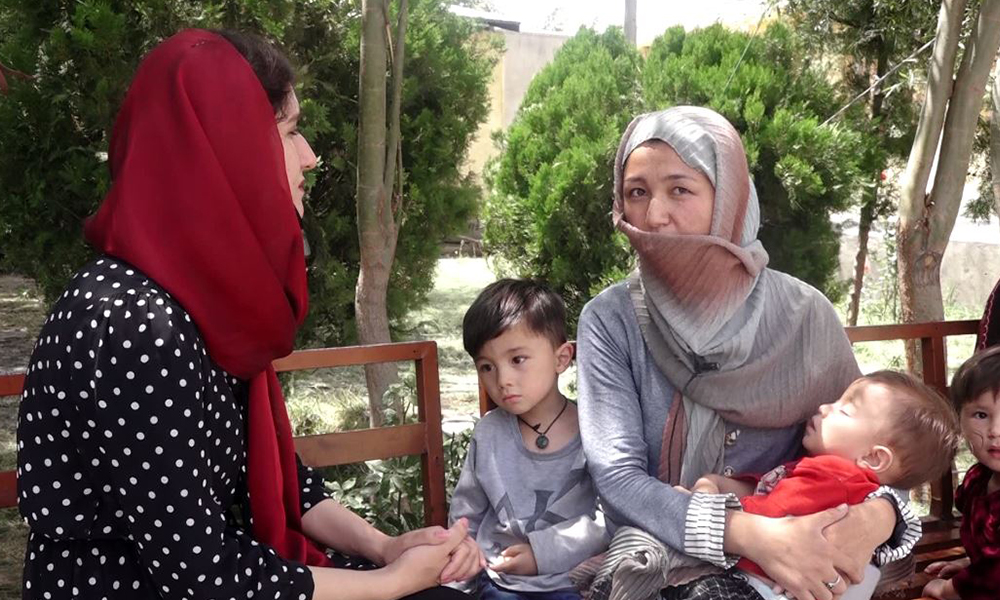Latest News
Rights watchdog calls for truce as IDP numbers skyrocket

The Afghanistan Independent Human Rights Commission has called on the Afghan government, the Taliban and the international community to support and strengthen efforts to bring about peace as the escalating violence has resulted in a spike in Internally Displaced People (IDPs).
In a report issued Wednesday by the AIHRC it said: “We call on the Afghan government, the Taliban, and the international community to work hard to support and strengthen the justice-oriented peace process, establish a ceasefire, and put an end to war and violence, as major causes of internal displacement in the country.”
The organization also urged relevant departments and other stakeholders to take immediate action to provide temporary housing for IDPs and to address their basic needs, particularly access to food, drinking water, and health services.
“We urge national and international organizations working in this field to work on developing programs and establishing or strengthening the structures required for IDPs’ access to housing, education, health, social participation, and psychosocial support,” the organization said.
This comes after the AIHRC conducted a field study in 30 provinces on the plight of IDPs.
According to the State Ministry for Natural Disaster Management statistics, almost five million people have been displaced due to insecurity and violence by anti-government armed groups in the past two years.
The AIHRC meanwhile said recent data indicates 62,480 families have been displaced in the last six months, out of which, 32,284 families from 25 different provinces have been displaced due to escalation of war and violence in just one month – between June 7th – July 8th.
A comparison of 2015 statistics by the Ministry of Refugees and Repatriations (1.2 million) and this year’s statistics by the State Ministry for Natural Disaster Management shows that the number of IDPs has increased by 74.8 percent
AIHRC investigations found that 158,392 families from 26 provinces have been displaced due to war and insecurity in the first three months of this solar year (March 20, 2021 to June 21, 2021).
Nangarhar, with 22,790 displaced families, is at the top of the list, while Samangan, with 100 displaced people, is at the bottom.
The AIHRC reported that out of all 2,903 respondents in its field study, 281 of them (9.7%) stated that they have been displaced for over five years; 118 respondents (4.1%) said they have been displaced for less than five years; 238 respondents (8.2%) less than four years; 353 respondents (12.2%) less than three years; 497 respondents (17.1%) less than two years; 449 respondents (15.5%) less than one year; and, 949 respondents (32.7%) less than six months.
The study also found that 2,475 respondents (85.3 %) said that they had suffered some type of harm to their permanent residence before being displaced.
Among the people who suffered some form of harm prior to being displaced, 543 (21.9%) lost family members; 316 (12.8%) or their family members have been injured; 849 (34.3%) lost their homes; 344 (13.9%) lost their crops; 247 (11.1%) lost their job; 63 (2.5%) or their children have been deprived of education; and, 86 (3.5%) have not responded this question.
Out of all 2,475 people who said that they had been harmed before being displaced, 2,062 of them (83.3%) said that anti-government armed groups harmed them; 233 of them (9.4%) said that pro-government forces had harmed them; and the remaining 180 of them have said that they have been harmed by natural disasters in their permanent residence.
The study also found that access to stable jobs, shelter, health services and education were also a problem for the IDPs.
Latest News
Dozens of U.S. lawmakers oppose Afghan immigration freeze after Washington shooting

Sixty-one members of the U.S. Congress have urged the Trump administration to reverse its decision to halt immigration processing for Afghan nationals, warning that the move unfairly targets Afghan nationals following a deadly shooting involving two National Guard members.
In a letter addressed to Secretary of State Marco Rubio and Homeland Security Secretary Kristi Noem, the lawmakers said the incident should not be used to vilify Afghans who are legally seeking entry into the United States. They stressed that Afghan applicants undergo extensive vetting involving multiple U.S. security agencies.
The letter criticized the suspension of Special Immigrant Visa processing, the termination of Temporary Protected Status for Afghanistan, and broader travel and asylum restrictions, warning that such policies endanger Afghan allies who supported U.S. forces during the war.
“Exploiting this tragedy to sow division and inflame fear will not make America safer. Abandoning those who made the courageous choice to stand beside us signals to those we may need as allies in the future that we cannot be trusted to honor our commitments. That is a mistake we cannot afford,” the group said.
The U.S. admitted nearly 200,000 Afghan nationals in the wake of the U.S. withdrawal from Afghanistan.
Thousands of Afghans who worked with the U.S. military and their families still wait at military bases and refugee camps around the world for a small number of SIVs.
Latest News
Magnitude 5.3 earthquake strikes Afghanistan – USGS

An earthquake of magnitude 5.3 struck Afghanistan on Friday, the United States Geological Survey (USGS) said.
The quake occurred at 10:09 local time at a depth of 35 km, USGS said.
Its epicentre was 25 kilometres from Nahrin district of Baghlan province in north Afghanistan.
Latest News
Chairman of US House intel panel criticizes Afghan evacuation vetting process

Chairman of U.S. House intelligence committee, Rick Crawford, has criticized the Biden administration’s handling of Afghan admissions to the United States following the 2021 withdrawal from Afghanistan.
In a statement, Crawford said that alongside large numbers of migrants entering through the U.S. southern border, approximately 190,000 Afghan nationals were granted entry under Operation Allies Welcome after the U.S. military withdrawal. He claimed that many of those admitted lacked proper documentation and, in some cases, were allowed into the country without comprehensive biometric data being collected.
Crawford said that the United States had a duty to protect Afghans who worked alongside U.S. forces and institutions during the two-decade conflict. However, he argued that the rapid and poorly coordinated nature of the withdrawal created conditions that overwhelmed existing screening and vetting systems.
“The rushed and poorly planned withdrawal created a perfect storm,” Crawford said, asserting that it compromised the government’s ability to fully assess who was being admitted into the country.
He said that there 18,000 known or suspected terrorists in the U.S.
“Today, I look forward to getting a better understanding of the domestic counterterrorism picture, and hearing how the interagency is working to find, monitor, prosecute, and deport known or suspected terrorists that never should have entered our country to begin with,” he said.
The Biden administration has previously defended Operation Allies Welcome, stating that multiple layers of security screening were conducted in coordination with U.S. intelligence, defense, and homeland security agencies. Nonetheless, the evacuation and resettlement of Afghan nationals remains a contentious political issue, particularly amid broader debates over immigration and border security.
U.S. President Donald Trump’s administration recently ordered its diplomats worldwide to stop processing visas for Afghan nationals, effectively suspending the special immigration program for Afghans who helped the United States during its 20-year-long occupation of their home country.
The decision came after a former member of one of Afghanistan’s CIA-backed units was accused of shooting two U.S. National Guard soldiers in Washington, D.C.
-

 Latest News4 days ago
Latest News4 days agoGermany speeds up admission of Afghans from Pakistan
-

 Sport4 days ago
Sport4 days agoIPL 2026 Auction set for Abu Dhabi with $28.6 million purse at stake
-

 Business5 days ago
Business5 days agoAfghan economy posts second year of growth despite deep structural challenges
-

 Latest News4 days ago
Latest News4 days agoAfghanistan to establish independent oil and gas authority
-

 Sport5 days ago
Sport5 days agoATN to broadcast ‘The Best FIFA Football Awards 2025’
-

 Latest News4 days ago
Latest News4 days agoUS intelligence chief warns of ‘direct threat’ from suspected terrorists inside the country
-

 Latest News3 days ago
Latest News3 days agoIEA supreme leader stresses enforcement of Sharia law and sincere public service
-

 International Sports4 days ago
International Sports4 days agoILT20: Desert Vipers qualify for playoffs with five-wicket win over Dubai Capitals

























